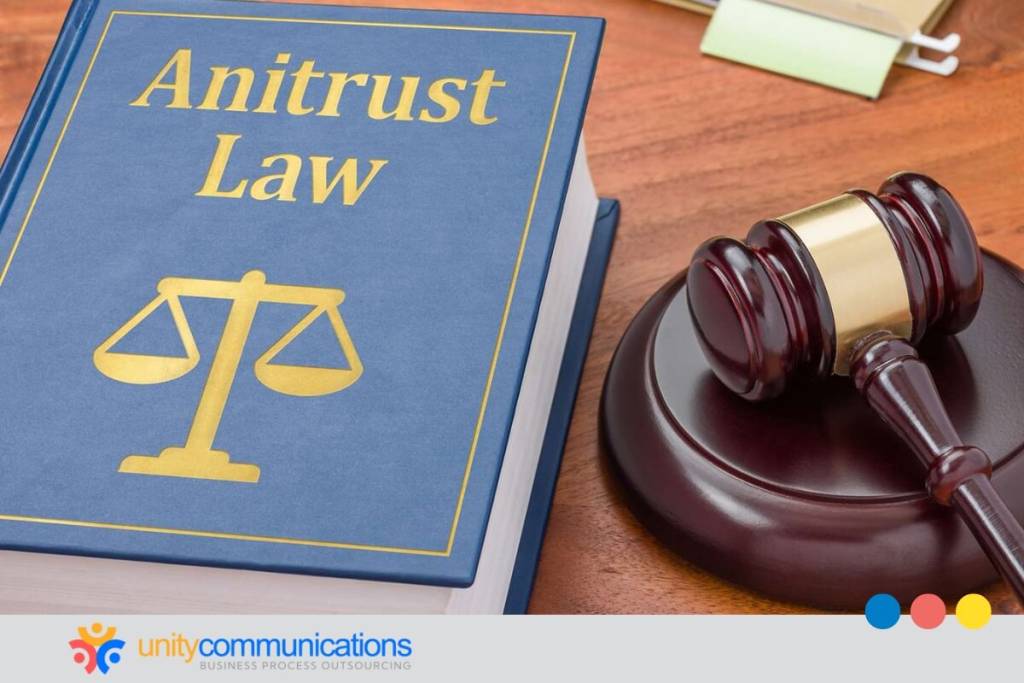IN THIS ARTICLE
Table of Contents
Antitrust laws shape competition, ensuring fair play and innovation in the business process outsourcing (BPO) industry and overall business landscape.
They promote market entry, consumer choice, and dynamic pricing while deterring conspiracy and monopolization. These laws foster a competitive environment where vendors compete based on service quality, price, and innovation.
This article explores the interconnection between outsourcing engagements and antitrust laws, its implications, and ways businesses can navigate compliance while maintaining a competitive edge.
What are antitrust laws?

Antitrust or competition laws are designed to promote fair competition and prevent anti-competitive practices in the marketplace.
The primary goal of antitrust laws is to protect consumers from monopolies, cartels, and other forms of market manipulation that can lead to increased prices, reduced innovation, and limited consumer choice. Antitrust laws typically prohibit various activities, including:
- Monopolization involves the abuse of market power by a single firm or company to eliminate competition or maintain dominance in a particular market.
- Price-fixing occurs when competitors agree to artificially set prices for their products or services rather than allowing market forces to determine them.
- Bid rigging is a deceptive practice in which competitors prearrange the winning party of a contract or bid, effectively eliminating fair competition.
- Market allocation involves agreements between competitors to divide markets or customers among themselves, limiting competition in specific regions or industries.
- Tying arrangements occur when a seller requires a buyer to purchase one product or service as a condition for purchasing another, thereby leveraging market power.
Antitrust laws are enforced by federal agencies, such as the United States Department of Justice (DOJ) and the Federal Trade Commission (FTC), as well as similar agencies in other countries.
Violations of antitrust laws can result in significant fines, injunctions, and other legal penalties for businesses engaging in anti-competitive behavior. The maximum punishment for violations is a 10-year prison sentence and a fine of up to $100,000,000 for each offense.
Additionally, private individuals and companies harmed by anti-competitive conduct may also have the right to pursue civil lawsuits for damages.
Outsourcing activities and how antitrust laws apply
So, how do antitrust laws affect BPO deals? Outsourcing activities and agreements are affected by antitrust laws in various ways, particularly when they involve multiple companies and have the potential to affect competition in the marketplace. Here are some key considerations:
- Bidding collusion. Companies might need to solicit bids from external vendors or service providers when outsourcing certain activities. Antitrust laws prohibit collusion among bidders to fix prices or rig bids. Companies must ensure that the bidding process remains competitive and free from any agreements that could harm competition.
- Market allocation. Outsourcing sometimes involves agreements between companies to divide markets or customers. For example, BPO companies serving the same industry might agree not to compete in specific geographic regions. Such arrangements can raise antitrust concerns as they limit competition and consumer choice.
- Monopolization concerns. Federal courts may scrutinize outsourcing agreements if they raise concerns about monopolization. For example, if a dominant player in the BPO industry excludes competitors or makes it difficult for them to compete, it can raise antitrust issues.
- Price fixing. State and federal antitrust laws prohibit price-fixing agreements, including agreements between companies to fix prices for outsourced goods or services. Companies engaging in outsourcing activities must determine pricing arrangements independently and competitively.
- Anticompetitive effects. Federal antitrust authorities may also examine the potential anticompetitive effects of outsourcing arrangements on the relevant market. If outsourcing substantially lessens competition or harms consumers by raising prices or reducing choice, it can attract antitrust scrutiny.
Impact of antitrust laws on the outsourcing market

Antitrust laws greatly impact outsourcing agreements and market competition. Here are some implications of antitrust laws on dynamic markets and agreements:
- Promotion of competition. Antitrust laws aim to promote competition. In outsourcing agreements, this means ensuring a level playing field for vendors to compete and offer their services based on price, quality, and innovation.
- Innovation incentives. Antitrust laws foster a competitive environment where companies are incentivized to differentiate themselves through product and service innovation. Competition among BPO vendors can drive innovation as they seek to offer new and improved solutions.
- Market entry and expansion. Antitrust laws facilitate market entry and expansion by preventing barriers to entry that could stifle competition. In the outsourcing industry, new vendors should be able to enter the market and compete with established players without facing unfair obstacles or discriminatory practices.
- Consumer choice. Antitrust laws protect consumer choice by ensuring that markets remain competitive and diverse. Clients must have a wide range of BPO vendors to choose from, allowing the selection of a provider that meets their needs in terms of price, quality, and service offerings.
- Dynamic pricing and contracting. Antitrust laws allow for dynamic pricing and contracting arrangements, where prices and terms may vary based on market conditions and negotiation. This flexibility encourages efficiency and responsiveness in BPO agreements, allowing clients and vendors to adapt to changing market demands.
Strategies for outsourcing antitrust compliance
The year 2022 saw 242 antitrust cases filed in federal district courts. When engaging in BPO activities, outsourcing clients should be aware of antitrust laws to ensure compliance.
So, what is the BPO clients’ responsibility in minimizing the risk of engaging in anticompetitive activity? Outsourcing clients should refrain from colluding with other companies in the industry to fix prices, allocate markets, or rig bids. Engaging in such practices can lead to severe legal consequences and reputational damage.
Clients should also ensure that the bidding process for outsourcing contracts remains competitive and transparent. They must solicit bids from multiple vendors and evaluate proposals based on price, quality, and services without entering into agreements that could restrain competition.
Here are more key points and strategies that BPO clients should keep in mind:
- Review outsourcing agreements. Clients should carefully review outsourcing agreements to ensure they comply with antitrust laws. They must assess pricing, exclusivity, market allocation, and termination clauses to identify potential antitrust issues.
- Monitor market dynamics. BPO clients should stay informed about market dynamics and changes in competition laws that may impact their outsourcing activities. Monitoring developments in antitrust enforcement and regulatory guidance helps ensure ongoing compliance.
- Seek legal advice. BPO clients should seek legal advice from antitrust experts to ensure compliance with relevant laws and regulations. Legal counsel can guide them in structuring outsourcing agreements to mitigate antitrust risks and avoid potential violations.
The bottom line

Companies engaging in outsourcing activities and agreements should be mindful of antitrust laws and ensure their conduct complies with competition regulations.
By being aware of antitrust laws and incorporating compliance measures into their outsourcing practices, BPO clients can minimize legal risks and foster a competitive and lawful business environment. Seek legal advice to ensure compliance and mitigate the risk of antitrust violations.
Let’s connect if you want to learn how to get started with outsourcing.





